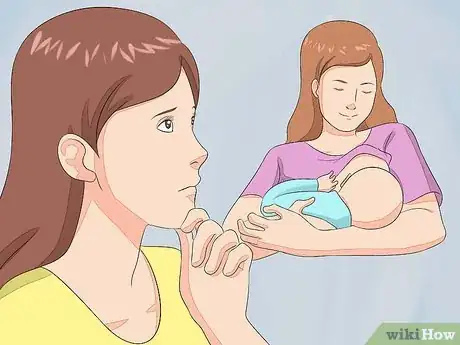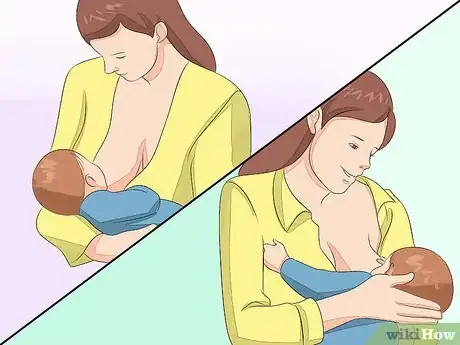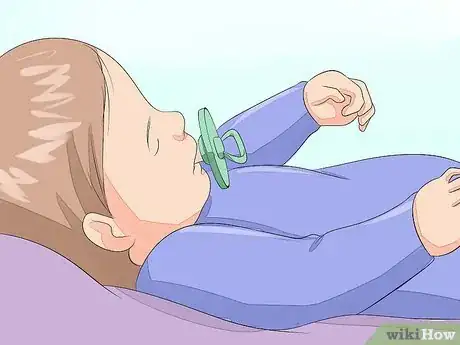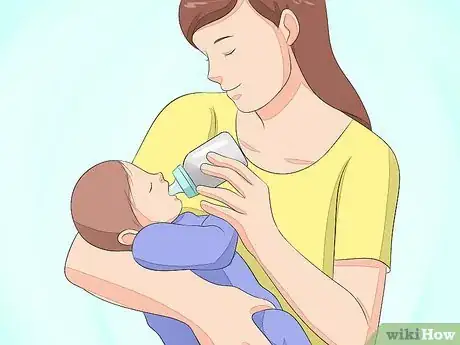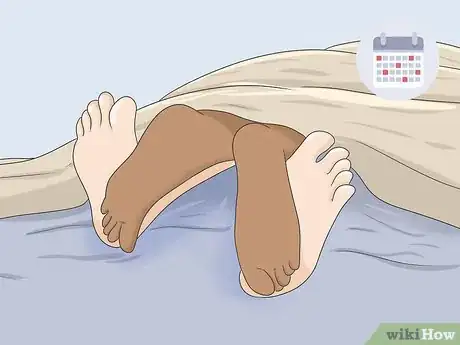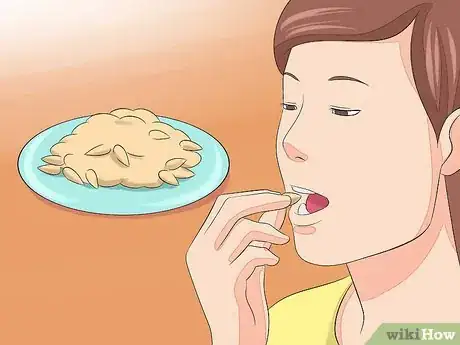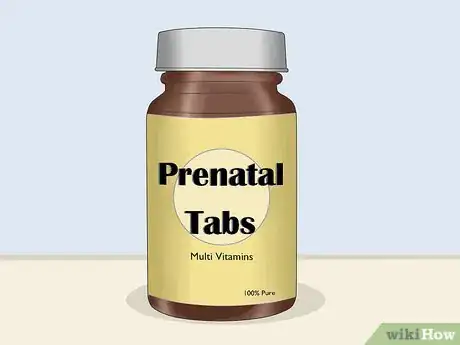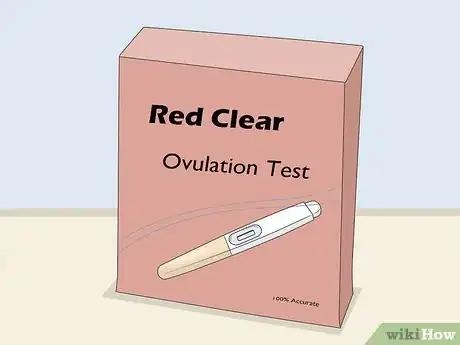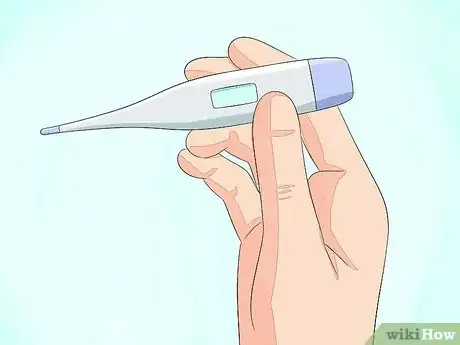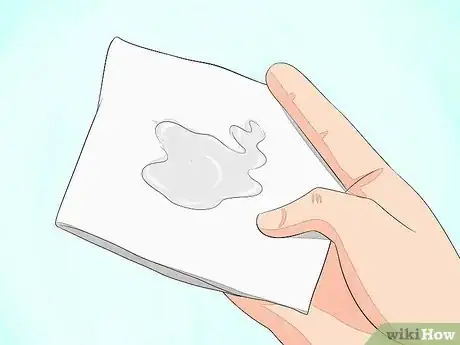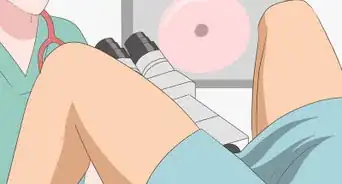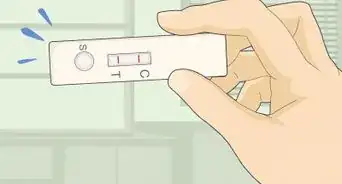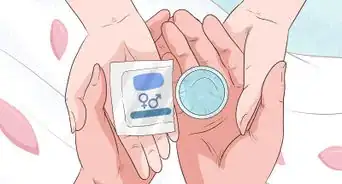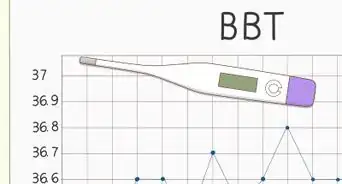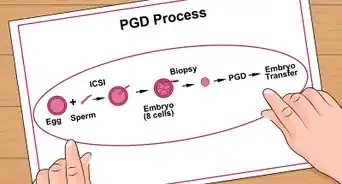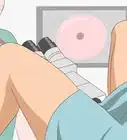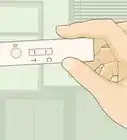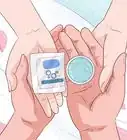This article was co-authored by wikiHow staff writer, Danielle Blinka, MA, MPA. Danielle Blinka is a Writer, Editor, Podcaster, Improv Performer, and Artist currently living in Houston, TX. She also has experience teaching English and writing to others. Danielle holds a Bachelor of Arts in English, Bachelor of Arts in Political Science, Master of Arts in English with a concentration in writing, and Master of Public Administration from Lamar University.
There are 9 references cited in this article, which can be found at the bottom of the page.
This article has been viewed 156,077 times.
Learn more...
When you’re breastfeeding exclusively, your period likely won’t return for at least the first 6 months after you have your baby. During this time, you might use breastfeeding as a natural form of birth control, which is called lactational amenorrhea method (LAM) . If you want to get pregnant right away, however, you might be worried about your missing period. Fortunately, you can get pregnant while you’re breastfeeding even if you haven’t gotten your period back.[1]
Steps
Changing Your Breastfeeding Cycle
-
1Pump your breast milk for some feedings. Typically, breastfeeding only prevents pregnancy if your baby is nursing. Your baby’s suckling triggers hormones that make more milk and suppress ovulation. If you pump your milk, it might reduce your hormone levels so that you can ovulate again. Try pumping for 1-2 of your daily feedings to help you ovulate.[2]
- Pumping shouldn’t affect your milk production, but it may help you ovulate.
- This is typically your best option because it allows you to continue feeding your baby on their regular schedule and you can still give them breast milk exclusively, if that’s what you prefer.
-
2Leave gaps longer than 6 hours between feedings. Breastfeeding may make you infertile if you do it every 4 hours during the day and every 6 hours at night. If you go longer than 6 hours without nursing, you might be able to start ovulating again. Space out your feedings so that you’re not nursing for at least 6 hours in a row once or twice a day.[3]
- For instance, you might nurse your baby at 6:00 a.m., 11:00 a.m., 4:30 p.m., 8:30 p.m, and 11:30 p.m. Keep in mind that this may not work if your baby is really hungry. Always put their needs first.
Advertisement -
3Stop overnight nursing to break the breastfeeding cycle. Most babies continue overnight feedings for several months. While this is a great time for bonding, it can also prevent you from ovulating. If you want to get pregnant, nurse your baby only during the day.[4]
- Ask your doctor if it’s okay to stop overnight feedings completely. If your baby needs to eat, you could give them expressed breast milk or formula.
- If your baby is sleeping through the night, don’t wake them up to eat.
Did You Know? Prolactin is a hormone that tells your body to make milk. It can also stop ovulation. Prolactin is higher at night, so skipping night feedings may help you ovulate sooner.[5]
-
4Replace breast milk with formula or cereal at some feedings. You need to breastfeed exclusively to stay infertile. If you introduce formula or cereal, it’s likely that you’ll disrupt the hormones that are preventing you from ovulating. Provide your baby with 1 or more formula feedings each day or give them rice cereal if the doctor says they’re ready.[6]
- Ask your doctor to recommend the best formula for your baby.
Making Lifestyle Changes
-
1Have sex every 5 days to increase your chances of pregnancy. It can seem really easy to get pregnant, but that’s often not the case. To conceive, live, healthy sperm need to be inside your body when a healthy egg is released. Frequent sex ensures you have sperm in your body if an egg is released. Sperm can live inside your body for up to 5 days, so have sex at least once every 5 days.[7]
Variation: If you’re using artificial insemination, ask your doctor when you should start trying. They might advise that you wait until you get your period so that you don’t waste sperm when you aren’t fertile.
-
2Apply lubricant if you have vaginal dryness after breastfeeding. It’s normal to experience vaginal dryness while you’re breastfeeding, so you may not get very wet when you’re aroused. This can make sex uncomfortable. Apply a lubricant prior to having sex to relieve your dryness.[8]
- Use a water-based or silicone-based lubricant, depending on your preferences.
- Make sure your lubricant doesn’t contain spermicide, which will prevent pregnancy.
-
3Stop smoking if you do. You’re likely not smoking right now because the nicotine can pass to your baby through your breast milk. If you are still smoking, it’s best to quit while you’re trying to conceive. Smoking lowers your levels of progesterone, which your body needs to prepare your uterus. Don’t smoke if you want to get pregnant.[9]
- Quitting is really hard, but you can do it. Try attending a support group to help you quit. Additionally, replace smoking with another behavior, like chewing gum.
- You likely won’t be able to use nicotine replacement products while you’re breastfeeding.
Making Dietary Changes
-
1Eat foods rich in omega 3 fatty acids to help you ovulate. Omega 3s naturally balance your hormones and improve blood circulation to your reproductive organs. They can also help increase your cervical mucus and may help you ovulate. Incorporate omega 3-rich foods into your diet to potentially help you get pregnant while you’re breastfeeding.[10]
- Foods rich in omega 3 are fatty fish, cod liver oil, canola oil, walnuts, pumpkin seeds, cashews, avocado, sunflower seeds, almonds, sesame seeds, olive oil, corn oil and safflower oil.
-
2Ask your doctor about royal jelly supplements. Royal jelly is made by bees and may help increase your fertility. It contains vitamin B6, which boosts your progesterone levels, as well as fatty acids that improve your egg quality. Additionally, it may help balance your hormones and maintain healthy gut bacteria to support your fertility. Take a daily supplement of royal jelly if your doctor says it’s safe.[11]
- While supplements are generally safe, they aren’t right for everyone. Check with your doctor to make sure royal jelly is safe for you.
-
3Take a prenatal vitamin to get the nutrients you need. Good nutrition can help balance your hormones so your cycle can return. Additionally, it may help you conceive and have a healthy baby. Consume prenatal vitamins daily to help you get the nutrition you need to breastfeed and increase your chances of getting pregnant.[12]
- Always check with your doctor before taking any vitamins and supplements.
Checking for Ovulation
-
1Use an ovulation kit to find out if you may be ovulating. Since your period happens when your body is shedding an unfertilized egg, your first ovulation will happen before you get your period back. That means you may already be fertile and not know it. If you’d like to monitor your fertility, get an ovulation kit from the store. Then, follow the directions on the box to find out if you might be ovulating.[13]
- Generally, you’ll urinate on an ovulation testing strip to find out if you’re ovulating. If the test is positive, you might be able to get pregnant if you have sex that day.
Tip: You can only get pregnant if you’re ovulating. Knowing when you may be ovulating will help you better time intercourse or insemination so you can get pregnant more easily.
-
2Track your basal body temperature to look for a small spike. Your temperature spikes slightly when you ovulate, so tracking your temperature can help you detect when you’re ovulating. Use a basal body thermometer to take your temperature every morning before you get out of bed. Track your readings so that you can look for a small spike of a few tenths of a degree. When this happens, you’re likely ovulating.[14]
- An average basal body temperature ranges between 97 to 97.5 °F (36.1 to 36.4 °C). During ovulation, it might rise to around 97.6 to 98.6 °F (36.4 to 37.0 °C).
- The changes in temperature can range from 0.2° to 0.5° C (0.4° to 1.0° F).
-
3Check your cervical mucus daily to tell when you’re ovulating. Your cervical mucus varies in consistency throughout your cycle. To check it, wipe the opening of your vagina before you pee, stick 2 clean fingers in your vagina to collect the mucus, or look at the discharge in your panties. Rub it to see if it’s sticky or slippery. Write down your observations to help you figure out if you might be ovulating.[15]
- If you feel dry, you probably aren’t ovulating.
- Yellow, white, or cloudy mucus that feels sticky may be a sign you’re about to ovulate.
- During ovulation, your mucus should look clear or slightly cloudy like egg whites. It’ll likely feel slippery and may stretch if you pull on it.
Warnings
- It’s generally recommended that you wait 12-18 months after giving birth to get pregnant again. This helps you have the healthiest pregnancy possible.⧼thumbs_response⧽
- Talk to your doctor before changing your baby’s feeding schedule.⧼thumbs_response⧽
References
- ↑ https://www.nhs.uk/conditions/pregnancy-and-baby/sex-contraception-after-birth/
- ↑ https://www.plannedparenthood.org/learn/birth-control/breastfeeding
- ↑ https://www2.hse.ie/wellbeing/child-health/breastfeeding-and-fertility.html
- ↑ https://www.nhs.uk/conditions/pregnancy-and-baby/sex-contraception-after-birth/
- ↑ https://www2.hse.ie/wellbeing/child-health/breastfeeding-and-fertility.html
- ↑ https://www.nhs.uk/conditions/pregnancy-and-baby/sex-contraception-after-birth/
- ↑ https://www2.hse.ie/wellbeing/child-health/breastfeeding-and-fertility.html
- ↑ https://www.plannedparenthood.org/learn/birth-control/breastfeeding/what-are-disadvantages-using-breastfeeding-birth-control
- ↑ https://www.ncbi.nlm.nih.gov/pubmed/9265557
- ↑ https://www.wellandgood.com/good-advice/best-foods-for-fertility/
- ↑ https://www.wellandgood.com/good-advice/best-foods-for-fertility/
- ↑ https://www.nhs.uk/conditions/pregnancy-and-baby/healthy-pregnancy-diet/
- ↑ https://www.plannedparenthood.org/learn/birth-control/breastfeeding/what-are-disadvantages-using-breastfeeding-birth-control
- ↑ https://www.uofmhealth.org/health-library/hw202058
- ↑ https://www.plannedparenthood.org/learn/birth-control/fertility-awareness/whats-cervical-mucus-method-fams
- ↑ https://www.plannedparenthood.org/learn/birth-control/breastfeeding
- ↑ https://www.nhs.uk/conditions/pregnancy-and-baby/sex-contraception-after-birth/
About This Article
If you want to get pregnant while you’re breastfeeding even if you haven’t gotten your period back, make some changes to your nursing schedule and lifestyle. Typically, breastfeeding only prevents pregnancy if your baby is nursing. Pumping your milk may reduce your hormone levels so you can ovulate again, so try pumping for 1 or 2 of your daily feedings. Another way to start ovulating again is to try to go longer than 6 hours without nursing once or twice a day. You can also stop nighttime nursing to increase your chances of getting pregnant. However, you may not be able to space out your feedings if your baby gets hungry often. Whatever you do, make sure to put your baby's needs first. If you’re not sure if you’ve started ovulating again, start having sex every 5 days to increase your chances of getting pregnant. To learn how to use royal jelly supplements to balance your hormones, keep reading!
